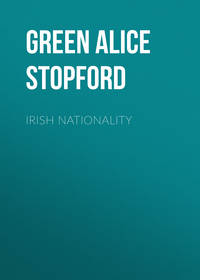 полная версия
полная версияTown Life in the Fifteenth Century, Volume 1
Gross, ii. 254. For the way in which a bit of the town under ecclesiastical and not under municipal control might serve as a sort of sanctuary against the tax gatherers, see the complaint of the Bristol commonalty about Temple Street. (Rot. Parl. i. 434.)
598
They had once been occupied by “good citizens,” but all through the Middle Ages were filled by a very poor population. (Kitchin’s Winchester, 75.)
599
Kitchin’s Winchester, 46-7, 75-7.
600
In 1264 there was a violent fray near the King’s Gate, the citizens fighting to keep the monks from admitting the followers of De Montfort. (Ibid. 130.) The convent kept control of the King’s Gate till 1520. (Ibid. 132.)
601
For the bishop’s rights during the fair such as tronage, authority to take all weights and measures and bear them to the Pavilion and there make assay, to demand that the people of the city should come to the Pavilion to present cry raised and bloodshed, and other things touching the peace of our Lord the King, see Hist. MSS. Com. vi. 595-605. Compare his powers in Southampton during the same fair. There he might send his bailiff to see that only food was weighed or sold in the town, that no merchant whether resident or not ventured to sell anything except food, that there was no weighing or measuring, that merchants who came with their goods swore they did not bring them to sell at this time. (Hist. MSS. Com. xi. part 3, pp. 67, 68.) The convent also had its own home and foreign trade on a very large scale. (Kitchin’s Winchester, 161.)
602
English Guilds, 353, &c. 358. (Hist. MSS. Com. vi. 495-605.)
603
This custom, once common (Madox, 152-3), was abandoned in Ipswich as early as 1317, and seems to have generally died out in the fourteenth century, though Gloucester sent its bailiffs to Westminster till 1483.
604
In 1244 a mayor who had obeyed the King’s orders to shut the city gates against a bishop whose election the King opposed, was severely punished by the bishop when he gained possession of his see and palace. (Kitchin’s Winchester, 121.) The mayor was thrown into a London prison because a state prisoner had escaped from Winchester. (Ibid. 139.)
605
Compare the action of Norwich. In the Wars of the Roses the Winchester people were, like their bishop Wayneflete, Lancastrian, but they had neither energy nor power to play any important part. (Hist. MSS. Com. vi. 147.)
606
Archæologia, i. 91, 93-4.
607
Gross, ii. 260-1.
608
Payments for stalls went to the King’s ferm. (Ibid. 262.) The question was therefore one of revenue and not one of protection.
609
Archæologia, i. 102.
610
The fraternity of St. John allowed nearly £35 a year towards the maintenance of the bridge and walls.
611
Hist. MSS. Com. xi. part 3, 77.
612
Ibid. vi. 595-605.
613
Gregory’s Chronicle of London, ed. Gairdner, Early English Text Soc. 199.
614
A charter of Edward the Fourth still speaks of Winchester as now being “quite unable to pay the fee-farm rent of 100 marks.” (Kitchin’s Winchester, 174.)
615
See the case of Lincoln, Rot. Parl. i. 156-7.
616
Hudson’s Leet Jurisdiction of Norwich (Selden Soc.).
617
Cutts’ Colchester, 149. Hudson’s Norwich Leet-Jurisdiction (Selden Soc.), 17. See pp. xxxvii., xli. The constables of Nottingham at the court leet present the “Master Official (of the archdeacon) for excessive and extorcious taking of fees” for probate of testaments, and for over assessing poor folks and men’s servants at Easter for their tythes. (Records, iii. 364.)
618
13 Richard the Second, 1, c. 18. Statute 4 Henry the Fifth, c. 5, repeats with some alterations that of Richard.
619
1454, Cutts’ Colchester, 150-1.
620
Hist. MSS. Com. v. 496.
621
Freeman’s Exeter, 165.
622
Freeman’s Exeter, 84-5, 165-6.
623
Shillingford’s Letters (Camden Society), p. 68. An order of the town had been issued in 1339 that no clerk of the consistory court was to be chosen mayor or bailiff or allowed to meddle with the elections. Freeman’s Exeter, 147.
624
The bishop had taken an action years before in 1432-3. Shillingford’s Letters, xiv.
625
Shillingford’s Letters, xxii. – iv.
626
Ibid. 98.
627
Ibid. xiv.
628
Shillingford’s Letters, 86-7.
629
Shillingford’s Letters, 75-6.
630
Ibid. p. 95-6.
631
Ibid. p. 1, 43.
632
Ibid. 10.
633
Shillingford’s Letters, p. 43, 44.
634
Ibid. xiv. – xvi.; Freeman’s Exeter, 158-60.
635
Shillingford’s Letters, p. 143, et seq.
636
Ibid. p. 58.
637
Shillingford’s Letters, 17.
638
Ibid. pp. 67, 68.
639
Ibid. 23.
640
Shillingford’s Letters, p. 6.
641
Ibid. p. 12.
642
Ibid. p. 12-15, 63.
643
The Recorder of Exeter.
644
Shillingford’s Letters, 146.
645
Ibid. 9.
646
Ibid. 23, 150.
647
Shillingford’s Letters, 37, 38.
648
Shillingford’s Letters, 11, 47.
649
Ibid. 43, 45.
650
Ibid. 32, see 11, 14, 20.
651
His temper towards ecclesiastical interference and his urbanity in argument are admirably shown in a letter to the bishop’s counsel. The rough draft of the letter ends with a fine outburst of anger. “We would fain have an end,” he writes, and goes on to ask how it was possible for any one ever to conceive that “John Shillyng, for no dread of great words of malice, disclaunders, language, writings, nor setting up of bulls to that intent to rebuke me and to make me dull to labour for the right that I am sworn to, for truly I will not be so rebuked nor dulled, but the more boldlier.” But he struck out this vigorous passage in the second draft in favour of a less belligerent sentence – ”for ye may fully conceive that my fellows and I would fain have a good end and peace, praying you to apply your good will and favour to the same.” Shillingford’s Letters, 25.
652
Shillingford’s Letters, 52-3.
653
Ibid. 78.
654
Shillingford’s Letters, 97.
655
Ibid. 53.
656
Ibid. 66, 10, 94.
657
Shillingford’s Letters, 53.
658
Ibid. 64.
659
Ibid. 93, 104.
660
Shillingford’s Letters, 16.
661
Ibid. pp. 10, 14, 91, 99, 104.
662
Ibid. 83-4.
663
Shillingford’s Letters, 83, 84, 99. Compare Norwich, Blomefield, iii. 62. In Canterbury the murder of a citizen by a waggoner of the priory in 1313 gave rise to a hot dispute as to the jurisdiction of the city coroner. The Convent refused him admittance within the priory gates, smuggled in an alien coroner to view the body, and then had it buried by the prior’s grooms. The story is given in an Inspeximus of Richard the Second; Muniments of Canterbury.
664
The distribution of taxes was a matter of special arrangement in the different towns. By the request of the canons the ecclesiastical tenants at Grimsby were not tallaged with the burgesses (Madox, 270). In Leicester the tenants of the Bishop’s Fee just without the walls did suit and service to the Bishop of Lincoln; a compromise had been made in 1281 by which it was decided that the Bishop’s tenants should share in certain common expenses, and should in return enjoy the franchises and free customs which had been won by the Merchant Guild of Leicester; but while the burgesses had to bear the charges both of “the community of the town,” and “the community of the guild,” the bishop’s tenants only paid for such matters as touched “the community of the guild,” and were not liable for the general town taxes. (Gross, ii. 140-1.) As early as 1189 the Guild of Nottingham obtained the right to raise contributions to the ferm rent from tenants of all fees whatsoever. In Norwich this was given in 1229 (Norwich Doc., Stanley v. Mayor, etc., 5, 6). But the question of collection still remained a burning one, and the itinerant justices having failed in 1239 to settle matters between the convent and the city, the King himself went to Norwich to insist on an agreement in 1241. (Blomefield, iii. 46.) See p. 357, note 4.
665
Shillingford’s Letters, p. 13.
666
Ibid. 79.
667
Shillingford’s Letters, 96.
668
Ibid. pp. 98, 108.
669
For the mayor’s defence, see p. x. 107-9.
670
The tenants of the hospital of S. John in Worcester refused to aid in tallages, to submit to the assize of bread and beer, under the town’s officers, and to keep watch and ward. In 1221 they were ordered to do all these things. (Select Pleas of the Crown, Selden Soc. p. 97.) In 1331 Norwich resisted the handing over of three houses to the prior and convent “for that a very great part of the same city which is inhabited, is in the hands of the prior and convent and of other religious persons, whereby the inhabitants are at their distress, and cannot be tallaged to the tallages and aids of the lord the King and of the city aforesaid as tenants should be, nor can they be in assizes, juries, and recognizances, whereby others dwelling in the same city are burdened and grieved more than usual by such gifts and assignments.” (Norwich Documents, Stanley v. Mayor, pr. 1884, 24, 25).
671
Shillingford’s Letters, 44-45.
672
Ibid. 52.
673
Shillingford’s Letters, 91-2, 104-5.
674
Ibid. 92.
675
Ibid. 100, 109.
676
Shillingford’s Letters, 84-5, 99.
677
In Canterbury also the Convent was bent on getting possession of that part of the covered way which lay along its territory, and the city wall itself so far as it touched the Cathedral precincts. Their first step was taken in 1160, and their final success was not assured till 1492, when the city resigned to the Convent the wall and covered way between Burgate and Northgate with the waste land adjoining, and the chapter was allowed to make a postern and to build a bridge across the foss. Such an arrangement was of course only possible at a time when peace with France, and the close of civil wars and riots at home had freed the town from danger of siege or revolution. (Lit. Cant., i. 60-2, iii. 318-20.) See also Davies’ Walks through York, 11, 12.
678
Shillingford’s Letters, 88, 89, 96.
679
Shillingford’s Letters, 93, 94.
680
Shillingford’s Letters, pp. 85, 86, 101, 110.
681
Ibid. 9.
682
Ibid. 20.
683
Shillingford’s Letters, 12.
684
Ibid. 10, 19.
685
The Commons had perhaps some reason to ask in 1371 that none but a layman should have charge of the seal. (Campbell’s Lives of the Lord Chancellors, i. 262.) This system, however only lasted till 1378, and in the next hundred years, out of 35 chancellors only eight were laymen.
686
Shillingford’s Letters, 11.
687
Shillingford, 136-140.
688
In 1463 when Edward granted the city fresh franchises and powers he exempted the close from civic jurisdiction. Freeman’s Exeter, 91.
689
In 1452 the judges held their assize in the hall of the bishop’s palace; the King being in the town it was proved to him that holding of assize in the bishop’s hall was a breach of the privileges of the church; two traitors who had been condemned were therefore pardoned by the King. Ibid. 89.
690
Hist. MSS. Com. ix. 150.
691
Ibid. 169.
692
Lit. Cant. i., lxi. Sandwich and Stonor were the two ports of London and therefore of considerable consequence. For the history of Stonor see Boys’ Sandwich, 552-5, 658-62.
693
Hist. MSS. Com. ix. 172-3.
694
Ibid. 150.
695
Ibid. 172-3, 141.
696
Hist. MSS. Com. ix. 139, 145.
697
Ibid. 173.
698
The cost was entered on the chamberlain’s accounts, but there is nothing more to tell how the matter ended. Ibid. 144.
699
Hist. MSS. Com. ix. 169-70.
700
Ibid. 170.
701
The details as to the costs of many of these feasts are preserved – the claret and wines white and red, and the beer and ale, which recommended a dinner made up for example of a swan, five capons, two geese, a side of brawn, two lambs, four rabbits, beef, marrow bones, a jowl of salmon, gurnards, roach, bread, spices, salt, vinegar, butter, milk, eggs, lard, and suet. Sacks of coal were always bought for the cooking of these great dinners, either charcoal sold in sacks, or “sea-cole” sold by the tub. Hist. MSS. Com. ix. 146, 163.
702
Ibid. 143-4.
703
Hist. MSS. Com. ix. 77.
704
Ibid. 112.
705
Lit. Cant. i. 216.
706
Ibid. iii. 379, 380.
707
Ibid. 318-320; Hist. MSS. Com. v. 433-4.
708
These charges were heavy in the southern towns. For example, Canterbury and Sandwich had to provide Warwick and his garrison with victuals in Calais in 1457. Oman’s Warwick, 64.
709
Lit. Cant. i. 213-222. This quarrel was 100 years old at this time. Hist. MSS. Com. v. 433.
710
Hist. MSS. Com. ix. 98.
711
Hist. MSS. Com. v. 521.
712
The last Jubilee, when the oblations amounted to £600, was celebrated in 1470. In 1520 the Pope demanded a half of the gross receipts, but the archbishop and chapter not being disposed to grant this no Jubilee was held. Literæ Cantuar. iii. xxxv., xxxvi.
713
Hist. MSS. Com. ix. 145-146.
714
Ibid. v. 433.
715
Hist. MSS. Com. v. 433-4.
716
Ibid. ix. 146-7. The chamberlain’s accounts give the costs of one visit to London of mayor and aldermen on business of the town. Three counsel were paid 10s.; one of them “in the cloister at Paul’s when he corrected the copy,” got 3s. 4d. and his clerk 12d. The mayor gathered together all the witnesses in a house beside Paul’s to rehearse their evidence “against they came into the Star Chamber,” and paid for bread and drink and house room for them 16d. At Westminster Hall the three counsel got 3s. 4d. each, and for the three days following the same fees were daily paid. In the Star Chamber Master Roydon paid for examination of sixteen persons at 2s. 4d. a man, 37s. 4d.; two days after fees were again paid to two counsel, and a breakfast given to Sir Matthew Browne. Master Fisher was paid for the fees of the Hilary term 19s. Warrants of attorney cost 4s., and copies of the panels 2s. The counsel had to be looked up in their country houses, and messengers were always crossing Tilbury Ferry to look for “Master Raimond,” and give him a retaining fee “to be our counsel,” or going to Finchley to seek “Master Frowick,” perhaps to find that “he was then ridden to Walsingham, so the said Thomas came to London homeward again.” The Master Recorder of London was met coming to the Temple and besought “to be good master to the city,” and retained at a cost of 6s. 8d. with a breakfast to his servants in Fleet Street. Then a messenger waited at the Guild Hall for the recorder, and again watched for him “the same day at afternoon at Milord Dawbeny’s place, there waiting till the said Master Recorder had supped, and when he came out we besought him to speed us, for the time of the forfeit passed not three days; which answered that he was sore occupied and might not entende it so shortly, where we took him 6s. 8d., and then he bade us wait on him on the morrow in the Temple. The next day when Mr. Recorder had contrived the bill and corrected it, for his reward 6s. 8d. Paid for a pike given to Master Mordaunt 3s. 4d.” The mayor then sent to Canterbury to direct that some gift should be sent up which might be used in “making friends”; and several members of the Common Council travelled up with two trouts (one trout cost about 10s.) and ten capons. The witnesses examined in the Star Chamber each got 6s. 8d. and their travelling expenses; after their examination they adjourned to the buttery for an entertainment, and paid “in reward to the officers of the King’s buttery for their good cheer 12d. and to the cook of the King’s kitchen 8d.” Besides all this there was a great deal of feasting and drinking in eight of the London inns, in Southwark, Cheap, Fleet Street, Paul’s Chain, and Holborn. Hist. MSS. Com. ix. 147.
717
The Plague. Hist. MSS. Com. ix. 147.
718
Ibid. 150.
719
Hist. MSS. Com. v. 433-4.
720
Hist. MSS. Com. v. 434.
721
The dispute in Norwich was brought before the king’s court in 1512. Documents, Stanley v. Mayor, &c., pr. 1884, 50-64.
722
Gross, i. 241-281.
723
See the saying of Bacon quoted by Anderson in his Origin of Commerce, ii. 232. “I confess I did ever think that trading in companies is most agreeable to the English nature, which wanteth that same general vein of a republic which runneth in the Dutch and serves them instead of a company; and therefore I dare not advise to adventure this great trade of the kingdom, which hath been so long under government, in a free or loose trade.”
724
Boys’ Sandwich, 770. The Custumals of Dover, Sandwich, Romney, Rye, and Winchelsea, are given in Lyon’s Dover, ii. 267-387.
725
The Ports with corporate members were: – Hastings: (Seaford, Pevensey). Sandwich: (Fordwich, Deal). Dover: (Folkestone, Faversham). Romney: (Lydd). Rye: (Tenterden). Hastings had six non-corporate members; Sandwich six; Dover seven; Romney four; and Hythe one; each of which was governed by a Deputy sent by the head Port.
726
Dover had always remained in the King’s hands, but Hythe and Romney belonged to the Archbishop, while Sandwich had been given to Christ Church, Canterbury, and Hastings, Winchelsea, and Rye had been handed over to the Abbey of Fécamp. A few details about the relations of Fécamp to its possessions at Hastings, Winchelsea, and Rye, may be found in Leroux de Lincy’s Abbaye de Fécamp, pp. 289, 294, 300, 327, 331; and a notice of the tax called aletot which was paid by the inhabitants of Rye to Fécamp, p. 299. The two parish churches of Hastings, being part of the alien priory of Fécamp, were never appropriate or belonging either to the College of S. Mary or to the Priory. They were afterwards granted away by Henry the Eighth (Horsfield’s Hastings, i. 448). The Counts of Eu held the Castle with the whole of the rape of Hastings and the manor till their estates were forfeited by rebellion about 1245 and given by Henry the Third to his son Edward. Moss’ Hastings, 3-4, 63.
727
There was a considerable change in the century that followed the complete political separation of England from the Continent. Henry the Third got back Rye and Winchelsea, and at least the Castle of Hastings if not more; and Edward the First Sandwich; while Hythe and Romney remained with the Archbishop.
728
For rights possessed in the time of Henry the Second see Hist. MSS. Com. v. 454.
729
Confirmed by Edward the First, 1293. Rot. Parl. i. 101. There were no coroners in the Cinque Ports except the mayors of the various towns. Lyon’s Dover, ii. 269, 347, 371, 303.
730
A writ of error lay to the Shepway Court only from any of the Ports; but from the Shepway finally there might be an appeal to the King’s Bench. (Boys’ Sandwich, 697, 771.) A mayor of Sandwich accused of assaulting the sheriff’s bailiff refused to answer except at the Court of Shepway. (Ibid. 661.)
731
Lyon’s Dover, ii. 304. See Rot. Parl. i. 332. For the charter of Edward the Third see Boys’ Sandwich, 568-9.
732
Boys, 470-1.
733
Montagu Burrows’ Cinque Ports, 73-4. The Cinque Ports joined Simon de Montfort against the King. Possibly this revolt was due to the limits fixed to their territory by Henry in 1259-60, for a little later the Barons’ party extended those limits. (Ibid. 107.) It was in this war too that they finally secured freedom from summons before the King’s Justices.
734
Boys’ Sandwich, 445. “Within the Cinque Ports there is no trial by jury as in other places.” Ibid. 452. For the system of compurgation see p. 465.
735
Ibid. 468.
736
Boys, 681.
737
Hist. MSS. Com. iv. 1, 425; v. 496; ix. 151.
738
Boys’ Sandwich, 682.
739
In 1395 Romney contributed nearly £10 to the maintenance of the liberties of the Cinque Ports, and in 1407, 1408, and 1409, it had to spend over £5 each year in payment for such purposes. The renewal of these charters on one occasion cost Hythe £17 as its share. (Hist. MSS. Com. v. 535, 537.) These payments were over and above the sums which had to be given for the charters of each separate Port, and which were also a heavy cost.




